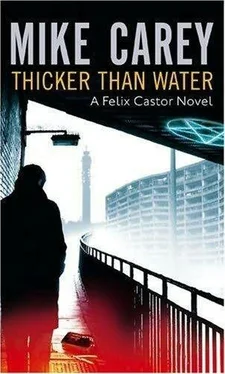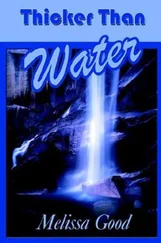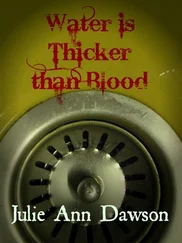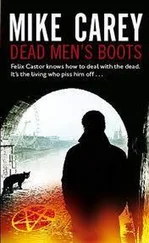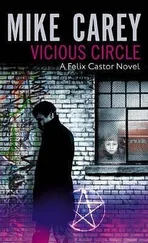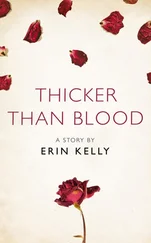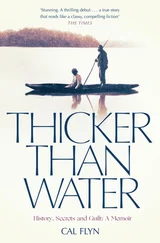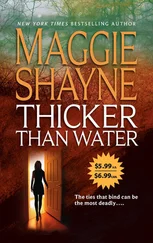She jerked her head in a way that obviously conveyed a lot of information to her entourage of bluebottles. Two of them fell in on either side of me and led me away.
It wasn’t as bad as it could have been. Basquiat played by the rules, mostly. She was just kidding about God’s pocket, but I got to keep my testicles.
She seemed mostly concerned with getting me on record about my previous relationship with Kenny, and she only cut up rough when I tried to back-pedal from the lurid story I’d sketched out on the overpass. I’ve had a few run-ins with the law in my time and I’m pretty good on the rules of evidence, so I knew that none of what I was saying could be used to establish just cause: but I also knew how bad it would sound in court if the Met ever did decide to charge me, so I was more careful with my phrasing than I’d been during the first rendition — and Basquiat, knowing her job, shone a torch into every area of vagueness and obscurity and tripped me up whenever I contradicted myself.
There was no malice in it, which made this a distinct improvement on the time when Basquiat had interviewed me with her fists in the course of the Abbie Torrington case. But I was still sweaty, dishevelled and exhausted by the time we were done — and, admiring the detective sergeant’s lean good looks in passing, I was reminded that there are more pleasant ways of getting that way.
After the interview and the grand, formal taking of the statement they left me to cool for a while in a smaller cell at the end of a long corridor that smelled of piss and stewed cabbage. Someone told me once that the Uxbridge Road cop shop used to be a workhouse back in Victorian times, and I can believe it. There’s a damp, miserable effluvium about the place that you’d need a Jamaican steel band and a flame-thrower to disperse. There are also a fair number of ghosts, and I got to meet three of them: two broadly human in appearance, the third an amorphous nightmare that had forgotten what it was long ago and now only held itself together by some inchoate impulse that kept it moving like a shark around and around the lower storeys of the building.
I was doing the same thing, only on the inside: prowling my own memories in pointless circles that always seemed to bring me out in more or less the same place.
Eventually Basquiat came back in and told me I was free to go.
‘What swung it?’ I asked her, knowing that she’d mainly been keeping me around while she made her mind up.
She looked at me hard for a second before answering: I had no right to ask, of course, and if they did end up charging me they wouldn’t want me in a position to second-guess the evidence. On the other hand, there’s never anything to lose by trying.
‘The forensics are starting to come through,’ she said grudgingly. ‘They confirm what Coldwood said about the prints. You weren’t one of the people who held that razor. There are also a few . . . anomalies about the wounds themselves. Things we’ll have to look at again.’ Her eyes defocused for a moment, as if she was taking that line of reasoning a little further inside her head. Then she recollected herself and became brisk. ‘So we won’t be charging you just yet, Castor. But you should probably keep yourself available in case we need to talk to you again. Tell us if you’re going anywhere.’
‘What about if I go to the Salisbury?’ I asked.
Her expression soured. ‘I’ve got two gorillas on my team,’ she said. ‘They were transferred out of Lambeth for questionable use of force. If I see you anywhere near my crime scene I’m going to get the pair of them to give you a Swedish massage in the back of a slam van. My sacred, solemn word.’
‘I’ve had promises like that before,’ I said, accepting the little bag with my belongings in it. ‘I always end up getting my heart broken.’
‘Don’t worry about your heart, worry about your neck,’ Basquiat suggested as she walked out.
Sometimes it’s best to let events take their course. As Taoists say, the best direction is wu wei — with the course of the water. You abandon the illusions of will and control and drift freely in the currents of life letting chance or fate choose your direction.
I’m not a Taoist. For the most part, when it comes to the river of life I sink to the bottom and then I start walking. Against the current.
So now, being a free man again and loosed onto the streets in the dazzling, over-emphatic sunshine, instead of declaring a goof-off day and making a beeline to the nearest pub to meditate on my misspent youth I found my thoughts drifting to the Salisbury — and to that stubborn stain of psychic effluent that I’d seen from afar. Was that what Kenny had been trying to tell me about?
Could it hurt to take a look?
The answer was yes, of course. It’s always yes. But I went anyway.
Back in the nineteenth century, when London was basically a big pile of crap with some buildings floating in it, and when a cholera epidemic was raging through the city like a drunk with a Gatling gun, they had this theory about what they were dying of. Nobody had made the link yet to infected water — not until John Snow came along in the 1850s with his epidemiological version of the New Testament. So the best idea they could come up with in the meantime was the miasma: a vast cloud of bad air, the exhaled breath of a million diseased and dying people, that drifted over London and infected you if you breathed it in.
That turned out to be bollocks, and Snow saved tens of thousands of lives when he tore the handles off the Soho pumps to prove his point. In the twenty-first century most people laugh at miasmas.
Not exorcists, though. We know better than anyone that things can gather in the air, unseen, and that you can breathe them in without knowing it. Most places have emotional resonances: random echoes of the emotions felt by the people who live in those places or walk through them. Mostly they stay at a low level because — to use a crude metaphor — the peaks and troughs don’t match up. It’s like ripples in a pond cancelling each other out as their wave fronts intersect. Occasionally, though, if a lot of people are feeling the same thing, then instead of cancelling each other out the emotions reinforce each other, etch themselves deeper and deeper into what we flippantly call reality. When that happens you can get a very strong emotional residue hanging over a particular place and enduring over time. Schools, prisons, death camps, brothels, army barracks, even churches: they have their own psychic flavour, which exorcists pick up on the same wavelength that allows us to see the dead. We’re like dogs in that way, pricking up our ears at a whistle that nobody else can hear.
The Salisbury Estate had an aura of this kind. I could feel it from a long way away, when I got off the bus at Burgess Park and started to walk north towards it. The closest of the towers was a good half a mile off, but already there was a thickening in the air that you could almost taste. The people around me — mothers with pushchairs, mainly, along with the occasional homeless guy and truanting kid, because this was the dead waste and middle of the day — didn’t seem to notice anything wrong. They kept right on walking, didn’t even look over their shoulders at the great grey towers looming behind them. So I knew it was my tuning-fork soul, resonating on a frequency that the rest of the world was deaf to.
The miasma intensified as I got closer, but although the individual towers of the Salisbury separated themselves out in my field of vision the feeling didn’t attach itself to any one of them.
The contradiction between those two impressions — the vividness of the sensation and the vagueness of its source — came as something of a surprise. I’ve learned the hard way that the physics of the material world don’t apply to my chosen field all that much: if they did, an enraged geist wouldn’t be able to pick me up and slam me into a wall because his massless form wouldn’t allow him any leverage. And zombies wouldn’t be able to move without a working heart to oxygenate their putrefying tissues.
Читать дальше
